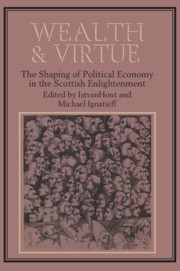Book contents
- Frontmatter
- Contents
- Preface
- List of abbreviations
- 1 Needs and justice in the Wealth of Nations: an introductory essay
- 2 Where had the Scottish economy got to by the third quarter of the eighteenth century?
- 3 Gershom Carmichael and the natural jurisprudence tradition in eighteenth-century Scotland
- 4 The Scottish professoriate and the polite academy, 1720–46
- 5 From applied theology to social analysis: the break between John Locke and the Scottish Enlightenment
- 6 The Scottish Enlightenment at the limits of the civic tradition
- 7 Adam Smith as civic moralist
- 8 The legal needs of a commercial society: the jurisprudence of Lord Kames
- 9 Cambridge paradigms and Scotch philosophers: a study of the relations between the civic humanist and the civil jurisprudential interpretation of eighteenth-century social thought
- 10 Adam Smith's ‘enduring particular result’: a political and cosmopolitan perspective
- 11 The ‘rich country–poor country’ debate in Scottish classical political economy
- 12 John Millar and individualism
- 13 Scottish echoes in eighteenth-century Italy
- Index
Preface
Published online by Cambridge University Press: 05 June 2012
- Frontmatter
- Contents
- Preface
- List of abbreviations
- 1 Needs and justice in the Wealth of Nations: an introductory essay
- 2 Where had the Scottish economy got to by the third quarter of the eighteenth century?
- 3 Gershom Carmichael and the natural jurisprudence tradition in eighteenth-century Scotland
- 4 The Scottish professoriate and the polite academy, 1720–46
- 5 From applied theology to social analysis: the break between John Locke and the Scottish Enlightenment
- 6 The Scottish Enlightenment at the limits of the civic tradition
- 7 Adam Smith as civic moralist
- 8 The legal needs of a commercial society: the jurisprudence of Lord Kames
- 9 Cambridge paradigms and Scotch philosophers: a study of the relations between the civic humanist and the civil jurisprudential interpretation of eighteenth-century social thought
- 10 Adam Smith's ‘enduring particular result’: a political and cosmopolitan perspective
- 11 The ‘rich country–poor country’ debate in Scottish classical political economy
- 12 John Millar and individualism
- 13 Scottish echoes in eighteenth-century Italy
- Index
Summary
A book such as this would not have been possible without the renaissance in studies of the Scottish Enlightenment which has taken place in the past fifteen years. This new work, associated especially with the names of George Davie, Duncan Forbes, Ronald Meek, James Moore, Nicholas Phillipson, John Pocock, Andrew Skinner and Donald Winch, has made possible a complex new understanding of Scottish jurisprudence, moral philosophy and political economy, and their origins in Scottish provincial culture and metropolitan politics. At the same time, new scholarship on Hobbes and Locke and the political philosophy of the three British revolutions of 1641, 1688 and 1776, on the continental natural jurisprudence tradition and on the English neo-Harringtonian forms of Machiavellian civic humanism, have made possible a new degree of precision in siting Scottish political economy on the map of the main traditions of European political, moral and legal philosophy. This book is an attempt to take stock of these achievements in scholarship. The specific occasion which gave rise to it was a colloquium held at King's College, Cambridge, in May 1979 on Scottish political economy and the civic humanist tradition. The papers by Istvan Hont, Nicholas Phillipson, John Pocock, John Robertson and Franco Venturi were originally delivered at that colloquium; the rest were given at the seminar series which preceded it or were commissioned for the volume. Each paper has been rewritten and extended for publication.
Information
- Type
- Chapter
- Information
- Wealth and VirtueThe Shaping of Political Economy in the Scottish Enlightenment, pp. vii - viiiPublisher: Cambridge University PressPrint publication year: 1983
